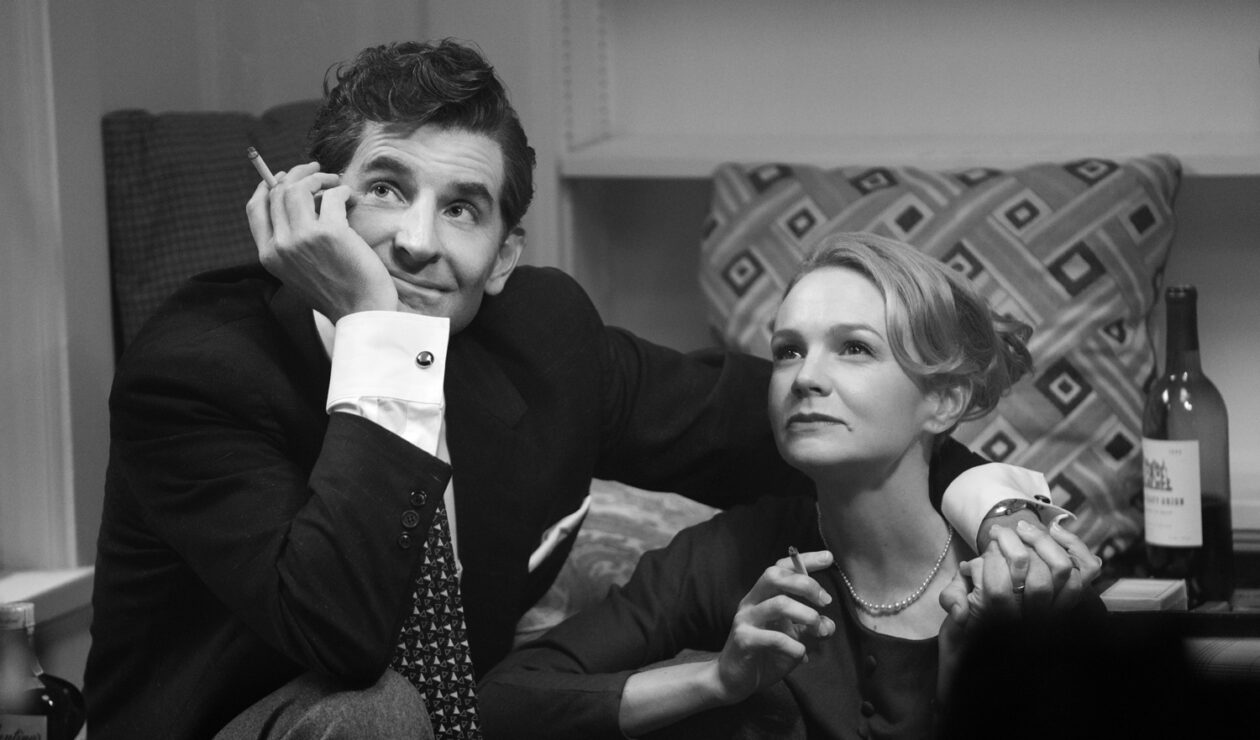Bradley Cooper has said he knew A Star is Born would succeed because of Lady Gaga’s talent, but Maestro was his to mess up. He co-wrote and directed the film, as well as starring as composer Leonard Bernstein, and brought in executive producers Martin Scorsese and Steven Spielberg for support.
He also studied conducting for six years just to pull off six minutes of expert performance replicating a 1976 concert Bernstein conducted, in front of the London Symphony Orchestra.
Cooper did the conducting live in a cathedral in tuxedo and prosthetics, and the film captures the raw exhilaration and rapture of elite concert performance. It is a staggering achievement and a highlight of an exceptional film about the genius of Bernstein, the complicated man who played piano, composed the music for West Side Story and conducted the works of Haydn, Beethoven, Brahms and Mahler.
Switching from high-contrast black and white to an evolving, colourised palette, the film opens with a relaxed youth in bed with another man leaping up to take a call. It is 1943 and the conductor of the New York Philharmonic has fallen ill. At a few hours’ notice, and without rehearsal, Leonard Bernstein conducts the orchestra at Carnegie Hall in a performance that is broadcast nationally.
It makes his name, and when he meets the South American actress Felicia Montealegre (Carey Mulligan), they are a perfect match. She is witty, beautiful and talented, and he adores her. Full of the confidence and optimism of youth, she encourages him to be his full self, believing they are so much in love they can navigate his discreet bisexuality together. And for a time, they do.
This is far from a straight biopic and the first scenes of Montealegre getting off a bus and walking down an avenue in party dress are moody and thrilling. The couple’s courtship in black and white at times becomes a musical, with Bernstein’s own music as the score. Mulligan radiates warmth and intelligence, and the camera is trained on her face so closely we see occasional traces of uncertainty creeping in. By the time Bernstein is less discreet and his campness more on show, her features are starting to strain.
Much has been made of the film’s use of a prosthetic nose, applied each day in five-hour sessions by expert technician Kazu Hiro. Yet it is done with such integrity that Cooper is from the start invisible inside his performance and the couple age on screen with a sense of naturalness. Unlike Nicole Kidman’s preposterous prosthetic as Virginia Woolf in The Hours, Cooper’s nose is quickly forgotten.
The music is so joyous and majestic it seems a shame most people will experience it on the small screen, although full credit to Netflix for taking it on. At full scale, with Bernstein’s own music threaded through – including excerpts from West Side Story and On the Waterfront – it is a cinematic experience drenched in music.

Get InReview in your inbox – free each Saturday. Local arts and culture – covered.
Thanks for signing up to the InReview newsletter.
Cooper portrays Bernstein, rightly or not, as something of a tortured artist, worried about his choices and legacy which seem puny against those whose works he conducts. He was also a man divided, who married and fathered three children, and loved his family even when they were not enough. The way Cooper pulls Bernstein’s story together is a proud artistic achievement and one of the finest films of the year.
Maestro is in select cinemas from now and releases on Netflix on December 20.
Support local arts journalism
Your support will help us continue the important work of InReview in publishing free professional journalism that celebrates, interrogates and amplifies arts and culture in South Australia.
Donate Here




